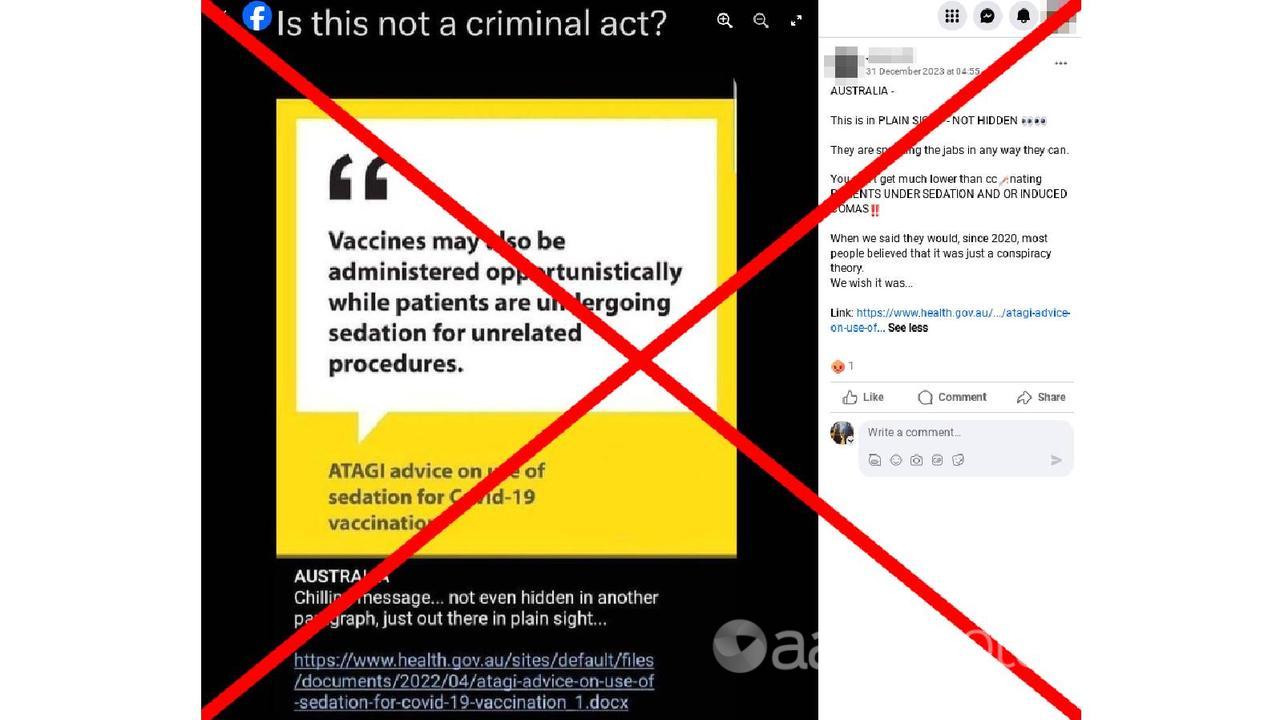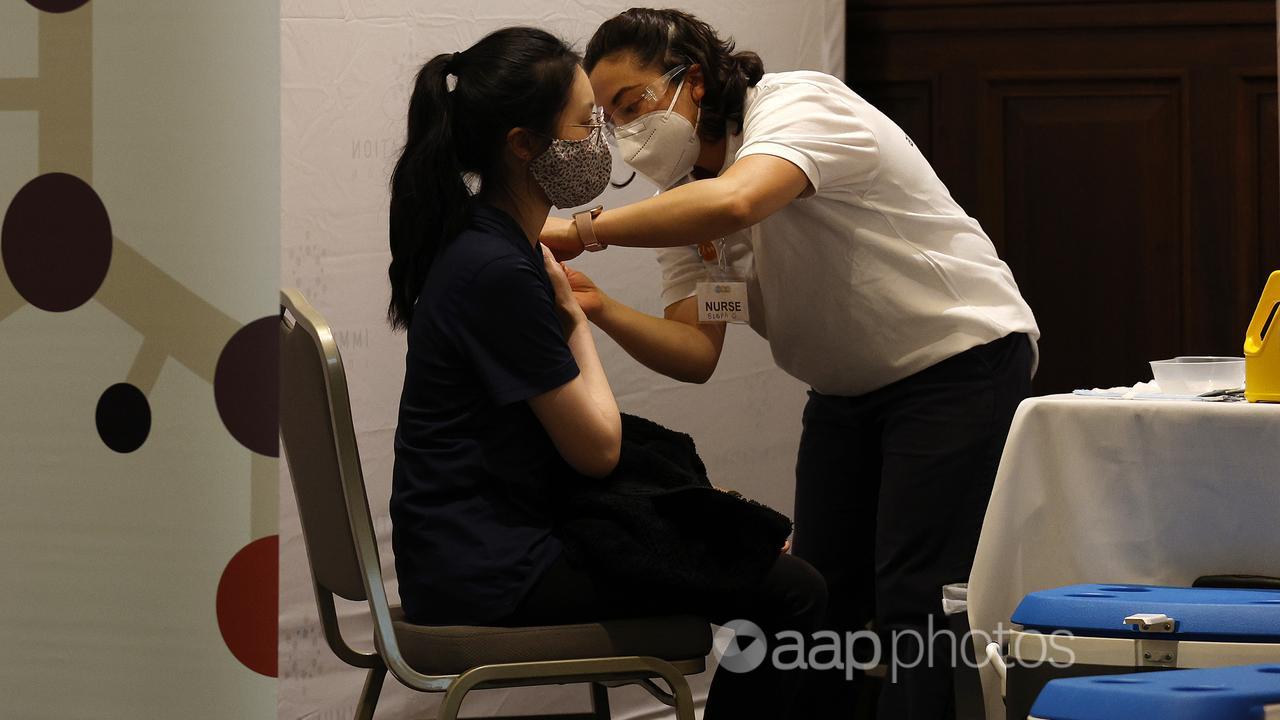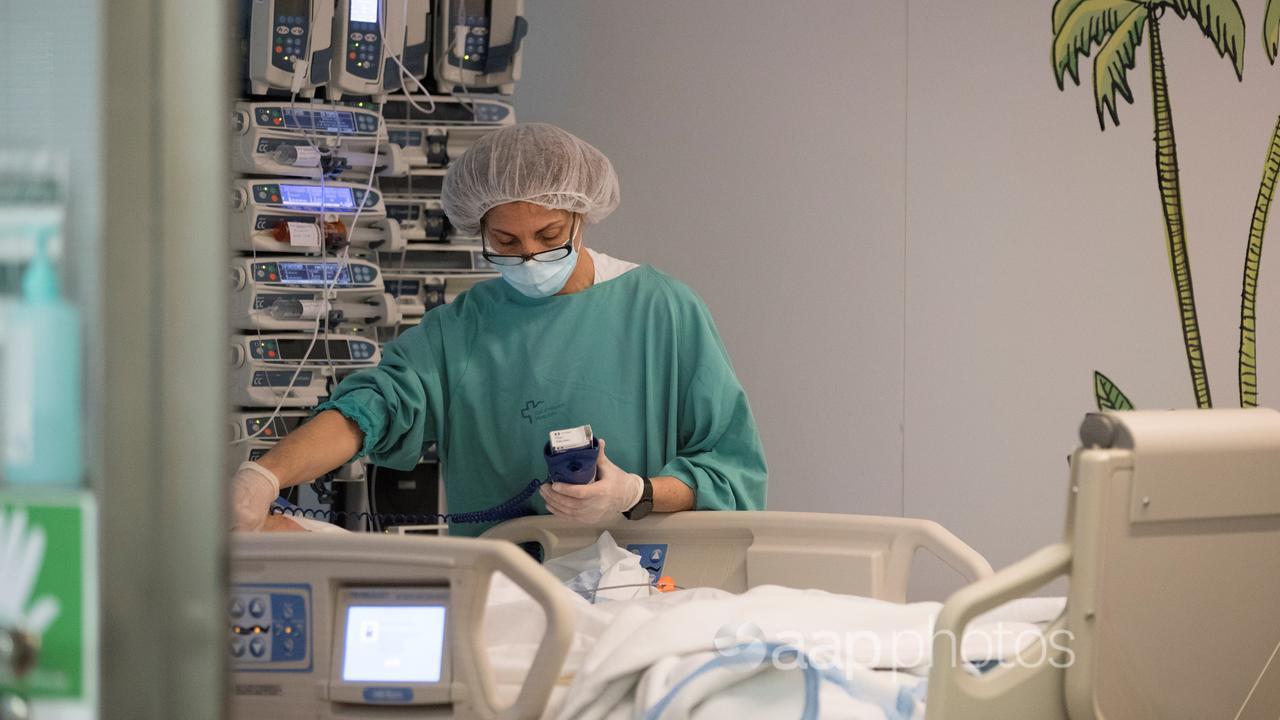A viral meme is being used to claim that Australian health practitioners have been permitted to administer COVID-19 vaccines to patients under sedation without their consent.
This is false. The Australian Technical Advisory Group on Immunisation (ATAGI) advice to doctors from early 2022 clearly states vaccines can only be administered for those under sedation with the informed consent of a patient, their parent or their guardian.
The advice concerns options for vaccinating consenting Australians who may have anxiety, needle-phobia or behavioural disorders.
Dozens of posts on Facebook have shared a graphic containing purported advice from ATAGI, the national vaccine advisory body, on vaccinating patients against the virus when they’re sedated.

“Vaccines may also be administered opportunistically while patients are undergoing sedation for unrelated procedures,” the graphic says.
Some of the posts share a screengrab from Instagram that says: “Australian Government puts out a chilling notice advising health officials to ‘opportunistically’ administer vaccines to patients who are under sedation or anesthesia (sic). This is horrifying.”
One post warns: “They better not have given me this vaxx while I was asleep intubated in the hospital… I better not find I’ve been vaxxed unknowingly.”
“They are sneaking the poison shots in any way they can,” says another post.
The posts resurrect a claim made by anti-vaccine mandate activist Graham Hood in a 2022 Facebook video, which was debunked at the time by AAP FactCheck.
Both Mr Hood and the recent posts refer to ATAGI advice from April 6, 2022, on the use of sedation when administering vaccines.
The sentence featured in the new yellow-and-white graphic is contained within the document. However, the graphic omits crucial information.
The document makes it clear that the advice is related to helping consenting people with anxiety disorders, needle-phobia and behavioural disorders.
“The process of administering a vaccine (i.e. giving an intramuscular injection) may cause severe anxiety in some individuals with anxiety disorders or needle-phobia, and/or may be difficult in certain individuals with behavioural disorders,” the ATAGI advice reads.
“In patients where non-pharmacological techniques have failed, sedation may facilitate safe administration of vaccines in some special circumstances.”

The ATAGI advice states clearly that “informed consent must be obtained” from a patient before each vaccine is administered.
Where the patient doesn’t have the capacity to give informed consent, a parent, guardian or substitute decision-maker must give consent.
“Sedation should not be used as a measure to enforce compliance with vaccination requirements,” the ATAGI advice adds.
The Australian Department of Health and Aged Care said it wasn’t aware of the recent meme, but said previous claims had been “comprehensively dismissed”.
“The ATAGI advice on use of sedation for COVID-19 vaccination includes information for providers on the risks and benefits of opportunistic vaccination during sedation for an unrelated procedure, noting that… it may be appropriate for some patients and should be strongly promoted when possible as it could avoid the need for a separate episode of sedation,” the representative told AAP FactCheck in an email.
“However it should only be considered during elective procedures where the patient is not acutely unwell.”

Dr Daryl Cheng, medical lead at the Melbourne Vaccine Education Centre, had his 2018 research paper on paediatric immunisations under sedation cited in the ATAGI advice.
He previously explained that opportunistic immunisation under sedation was not the same as vaccinating without consent.
“Sedation and/or general anaesthetic has its own risks, and so is not something clinicians do without due consideration and consent from parents/guardians,” Dr Cheng told AAP FactCheck in an email.
“Any test, immunisation or procedure, just like surgery, requires informed consent before it is undertaken.”
The Verdict
The claim that the Australian government allows health practitioners to vaccinate patients under sedation without their knowledge is false.
The Australian Technical Advisory Group on Immunisation advice makes clear that “informed consent must be obtained” from a patient, parent or guardian before each COVID-19 vaccine is administered.
The advice is related to options for vaccinating consenting Australians who may have anxiety, needle-phobia or behavioural disorders.
False — The claim is inaccurate.
AAP FactCheck is an accredited member of the International Fact-Checking Network. To keep up with our latest fact checks, follow us on Facebook, Twitter and Instagram.
All information, text and images included on the AAP Websites is for personal use only and may not be re-written, copied, re-sold or re-distributed, framed, linked, shared onto social media or otherwise used whether for compensation of any kind or not, unless you have the prior written permission of AAP. For more information, please refer to our standard terms and conditions.


















